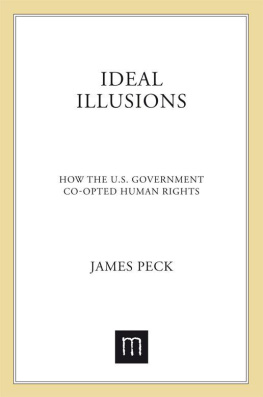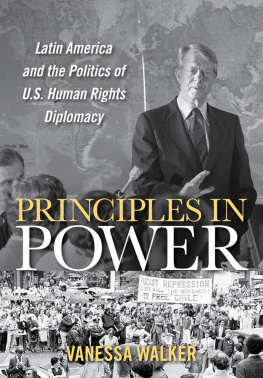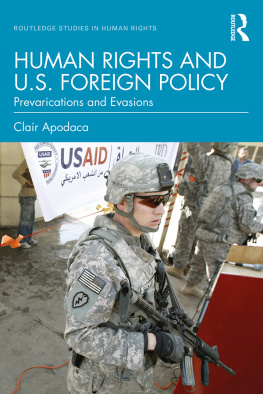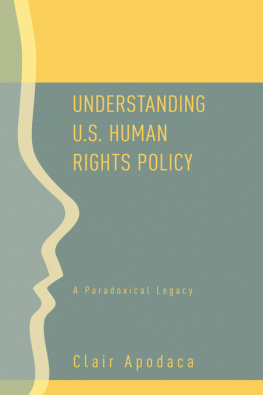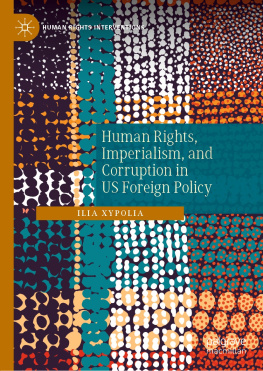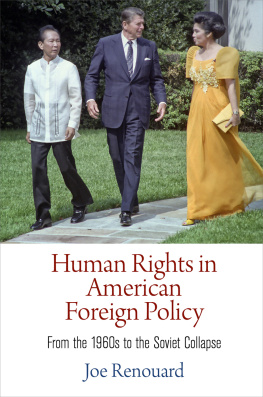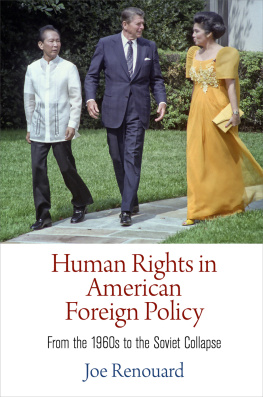
In Memory of
Hao, Helen, and Sol
and for
Laurie
CONTENTS
INTRODUCTION
Follow an idea through from its birth to its triumph, Bertrand de Jouvenel observed in his 1948 volume On Power , and it becomes clear that it came to power only at the price of an astounding degradation of itself. The result is not reason which has found a guide but passion which has found a flag. The widely heralded rise of human rights is not free of such complications. For the history of human rights in the United Statesas a movement, as an impassioned language of good intentions, and as an invocation of American idealismowes far more to the inner ideological needs of Washingtons national security establishment than to any deepening of conscience effected by the human rights movement. Thousands of national security documents (from the CIA, the National Security Council, the Pentagon, think tanks, and U.S. government development agencies) reveal how Washington set out after the Vietnam War to craft human rights into a new language of power designed to promote American foreign policy. They shed light on the way Washington has shaped this soaring idealism into a potent ideological weapon for ends having little to do with human rightsand everything to do with extending Americas global reach.
This obviously isnt the way human rights leaders have understood the movements history. For years they extolled its rise as the triumph of a compelling new moral vision that began with the United Nations Universal Declaration on Human Rights in 1948. Out of the reaction to Nazi atrocities, goes the popular narrative, came human rights. Never again would the world stand by in the face of wholesale torture and murder. As human rights became the vocabulary of a vibrant new conception of public good, it promised a sense of solidarity beyond borders, a voice raised on behalf of victims everywhere. By the late 1970s, these early hopes and aspirations had come to flourish in a vigorous movement developing in think tanks, foundations, law schools, UN forums, congressional committees, professional associations, and international nongovernmental organizations (NGOs).
The United States, with its longstanding ideals and its traditional respect for civil liberties, was a natural ally, a powerful force for global human rights, according to Amnesty International USA. Of course, the movements leaders note, Washington itself has committed some terrible human rights violationsCIA-fomented coups, renditions, Guantnamo. But these and similar mistakes or shortsighted strategic calculations could not permanently tarnish Washingtons moral authority. When mistakes or crimes occurred, those committed to opposing such egregious acts saw their task as shaming Washington into changing its ways.
At the same time, the willingness of American citizens to expose their own governments brutalities offered further evidence of freedom at work. For the movements leaders and for many ordinary citizens, the ability to criticize was inextricably paired with the nations deeper virtue. No other country enjoyed such immunity. Indeed, where the countless human rights abuses committed by the Soviet Union, China, and other nations exposed who they really were, our own were aberranta reflection of who we really werent. Whatever moral equivalence there was among atrocities did not extend to the parties committing them. American policies were fundamentally progressive. With all these views Washingtons foreign policy leaders heartily concurred.
Of course, when a government and its critics share the same language, they are not necessarily saying the same thing. But adept leaders, as Harold Lasswell noted in his classic 1927 study Propaganda Technique in the World War , know that more can be won by illusion than coercion. And no ideological formulation has been more astutely propagated by Washington for the past four decades than the notion that a rights-based United States is the natural proponent of human rights throughout the world. In part, the rise of human rights recapitulates the old tale of popular idealism seeking to affect power, and power, in turn, shrewdly subverting that idealism to its own ends. Even as the human rights community has methodically focused on Washingtonsand othersmany violations, it has largely recoiled from analyzing the fundamental structures of American power. As a result, it has unwittingly served some of Washingtons deepest ideological needs.
Not enough attention has been paid to the interweaving of idealism and national security concerns, yet it is here that the real history of human rights can be found. Human rights erupted into the mainstream of public debate only because two quite distinct needs came together. On one side, a profound revulsion over the Vietnam War led to the weakening of the anticommunist consensus. Appalled by Cold War rationales and tactics (overthrowing regimes, assassinating leaders, training torturers, supporting dictatorships), human rights advocates mobilized against both American excesses and Soviet crimes, documenting in particular the atrocities of American-backed military regimes throughout Latin America, from Guatemala to Chile. On the other side, Washington was desperate for new ideological weapons to justifyboth at home and abroadits global strategies. Human rights advocates sought to infuse Washingtons policies with their high-minded ethos just as Washington was fashioning a rights-based vision of America to support its resurgent global aims.
A central question is: who influenced whom? Human rights leaders are convinced they pressured Washington into taking up their cause. Yet in truth their movement gained much of its momentum from Washingtons subtle promotion of what they think of as their own agenda. Before the major American rights groups were created, Washingtons national security managers had been discussing the desirability of a national organization to offset the foreign influence of the London-based Amnesty International. Before human rights leaders began advocating for extending the laws of war to outlaw abuses by antigovernment guerrilla forces, Washington pursued the same goal as a way of discrediting almost all insurgency movements. And a new humanitarian ethos legitimizing massive interventionsincluding waremerged in the 1990s only after Washington had been pushing such an approach for some time. In short, the vocabulary and the arguments of the human rights movement almost all have significant precursors in Washingtons national security concerns.
From Washingtons perspective, the fierce Cold War ideological battles between the Free World and its adversaries necessitated lumping together a wide array of radical movements, dissident ideas, and nationalist strugglesall perceived to be inimical to the demands of an America-centered worldin order to dismiss them. But Washington knew all too well that the Free World could hardly restrict its constituents to free countries; it had to align itself with various dictators and brutally repressive regimes. Still, the great war of ideas demanded a line be drawn between democratic societieswith free institutions, representative government, and free electionsand those that denied freedom and individual rights.
From the earliest years of the Cold War, Washington predicated its war of ideas on a set of deep divisions: between freedom and equality, reform and revolution, self-interest and collective interests, the free market and state planning, and pluralistic democracy and mass mobilization. American human rights leaders largely, if unknowingly, built on this divide. They usually felt more at ease associating human rights with civil rights and political freedoms, the individual, the market, and pluralistic openness, while seeing the perils in revolution and concentrations of state power. They preferred not to dwell on what might compel populations, as the Universal Declaration of Human Rights warned, to rebellion against tyranny and oppression; nor did they acknowledge that it often takes militant mass movements, both violent and nonviolent, to pressure states and powerful interests into acquiescing to programs promoting greater social justice. They considered the struggle for human rights largely apart from peace movements and efforts toward disarmament and the banning of nuclear weaponry, and they took no stand on issues of war and aggression. They mostly viewed resistance movements through the prism of individual rights rather than considering the role of resistance and mass mobilizations in the creation and nourishment of rights.
Next page
